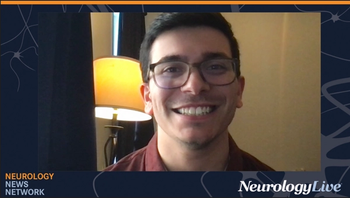
Ashish Pradhan, MD, the executive director and disease area lead for MS and NMOSD, Genentech, offered insight on a number of presentations at the 2021 ECTRIMS Congress.

Ashish Pradhan, MD, the executive director and disease area lead for MS and NMOSD, Genentech, offered insight on a number of presentations at the 2021 ECTRIMS Congress.

Discussing this year’s virtual ECTRIMS conference, the Zimmermann Professor of Neurology and Neurological Sciences, and Pediatrics at Stanford University provided his opinion on recent developments in the MS field. [WATCH TIME: 3 minutes]

Investigators found that women with early-onset myasthenia gravis display distinct clinical features in contrast with men with the same condition, who are more like patients with late-onset MG of both sexes.

The professor of neurology at the NYU Grossman School of Medicine provided context on the preliminary data evaluating antibody response in ocrelizumab-treated patients post-vaccine. [WATCH TIME: 5 mintues]

The director of the Mellen Center for MS Treatment and Research at Cleveland Clinic discussed the realistic outlook of mesenchymal stem cells and other approaches to progressive MS.

William B. Young, MD, codirector of Inpatient Program at Jefferson Headache Center, discussed how the clinical and patient communities can squash misguided migraine stigmas.

The Zimmermann Professor of Neurology and Neurological Sciences, and Pediatrics at Stanford University discussed the treatment’s potential in the multiple sclerosis space, where there are other competing drugs with similar safety profiles. [WATCH TIME: 4 minutes]

Megan Weigel, DNP, APRN-C, APHN-C, MSCN, discussed findings from a study of integrative medicine via a virtual, 6-week workshop, which produced varied results.

Patients with chronic insomnia were included in the study to understand whether priming is necessary for partial reinforcement of treatment responses.

The headache specialist at Jefferson Headache Center discussed the need to revamp the education process for migraine care and how much time residents spend learning about the disease. [WATCH TIME: 2 minutes]

Two hours post-treatment with the remote electrical neuromodulation device resulted in the improvement of nausea, photophobia, phonophobia, and functional ability.

The primary pharmaceutical options suggested by national guidelines were considered effective by only 13.8% and 14.9% of the patients with persistent idiopathic facial pain.

The authors noted that the CBT-acupressure approach may serve particularly well for individuals whose cultural values align with traditional Chinese medicine approaches.

After showing potential remyelination effects, the director of the Multiple Sclerosis Center at Ochsner Health offered her perspective on the latest data for ATA188 in progressive MS. [WATCH TIME: 4 minutes]

Treatment of ALS with tofersen resulted in differences in total cerebrospinal fluid SOD1 protein and neurofilament light chain, both markets of target engagement and neuronal degeneration.

The professor of neurology at the NYU Grossman School of Medicine discussed the trial design of VIOLA, a new prospective study evaluating responses to COVID-19 vaccines in patients with MS on ocrelizumab (Ocrevus; Genentech). [WATCH TIME: 3 minutes]

Here's what is coming soon to NeurologyLive.

In the final day’s plenary session at ECTRIMS Congress, Ruth Ann Marrie, MD, PhD, FRCPC, FCAHS, gave a look into some of the notable presentations from the annual meeting.

An indirect comparison study evaluated relative treatment effects of eculizumab (Soliris; Alexion), inebilizumab (Uplizna; Horizon), and satralizumab (Enspryng; Genentech), the 3 FDA-approved options for NMOSD.

In light of the RISE-PD study data, the research chair for Parkinson’s Disease and Movement Disorders at University of Cincinnati Health offered insight into IPX-203 in Parkinson disease. [WATCH TIME: 3 minutes]

Roderick Spears, MD, FAHS, FAAN, professor of neurology, University of Pennsylvania, discussed the need to raise awareness of migraine and how the community can build upon the progress made.

The workshop included weekly virtual meetings on journaling, meditation, yoga therapeutics, among other activities.

Neurology News Network for the week ending October 15, 2021. [WATCH TIME: 3 minutes]

Action is not anticipated to be taken this month, with a new target action date to be provided.

Investigators concluded that treatment with high-efficacy disease-modifying therapies was a protective factor in disease prognosis.

Take 5 minutes to catch up on NeurologyLive's highlights from the week ending October 15, 2021.

The Zimmermann Professor of Neurology and Neurological Sciences, and Pediatrics at Stanford University spoke on the safety and efficacy of ublituximab in treating patients with relapsing forms of multiple sclerosis. [WATCH TIME: 4 minutes]

Data presented at the ECTRIMS Congress 2021 noted immunity was reduced in patients taking anti-CD20 monoclonal antibodies.

The director of the Multiple Sclerosis Center at Ochsner Health discussed the open-label extension data presented at ECTRIMS Congress on ATA188 in progressive MS. [WATCH TIME: 4 minutes]

The vast majority of patients with MS, 63.4%, who initiated ofatumumab treatment in the 6 months after its approval had mild disability, while only 29.2% had moderate disability and 7.4% had severe disability.